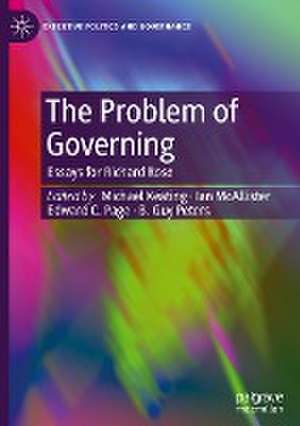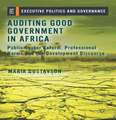The Problem of Governing: Essays for Richard Rose: Executive Politics and Governance
Editat de Michael Keating, Ian McAllister, Edward C. Page, B. Guy Petersen Limba Engleză Hardback – 7 dec 2023
Preț: 694.73 lei
Preț vechi: 763.44 lei
-9% Nou
Puncte Express: 1042
Preț estimativ în valută:
132.93€ • 139.17$ • 109.100£
132.93€ • 139.17$ • 109.100£
Carte disponibilă
Livrare economică 11-17 martie
Livrare express 04-08 martie pentru 78.85 lei
Preluare comenzi: 021 569.72.76
Specificații
ISBN-13: 9783031408168
ISBN-10: 3031408160
Pagini: 284
Ilustrații: XXIII, 284 p. 3 illus.
Dimensiuni: 148 x 210 mm
Greutate: 0.51 kg
Ediția:1st ed. 2023
Editura: Springer Nature Switzerland
Colecția Palgrave Macmillan
Seria Executive Politics and Governance
Locul publicării:Cham, Switzerland
ISBN-10: 3031408160
Pagini: 284
Ilustrații: XXIII, 284 p. 3 illus.
Dimensiuni: 148 x 210 mm
Greutate: 0.51 kg
Ediția:1st ed. 2023
Editura: Springer Nature Switzerland
Colecția Palgrave Macmillan
Seria Executive Politics and Governance
Locul publicării:Cham, Switzerland
Cuprins
Chapter 1: Introduction: Richard Rose: Connections Over Sixty Years.- Part I: Governing at Multiple Levels.- Chapter 2: Politics in England.- Chapter 3: The United Kingdom as an Intellectual Puzzle.- Part II: Parties and Elections.- Chapter 4: Must Labour Lose?.- Chapter 5: Studying the Interplay of Party Support and Turnout.- Part III: Institutions and Governing.- Chapter 6: Presidents and Prime Ministers: Then and Now.- Chapter 7: The Problem of Party Government.- Chapter 8: Understanding Big Government.- Part IV: Public Policy.- Chapter 9: Learning Across Time and Space: Richard Rose’s Work on Lesson-Drawing.- Chapter 10: Inheritance Before Choice.- Chapter 11: The Ordinary People Perspective: Coping at the Grass-Roots.- Chapter 12: Governments and Citizens Under Stress.- Part V: Trust and Legitimacy.- Chapter 13: Democracy and its Alternatives.- Chapter 14: Northern Ireland: Searching for Consensus.- Chapter 15: Reflections.
Notă biografică
Michael Keating is Emeritus Professor at the University of Aberdeen, UK
Ian McAllister is Distinguished Professor of Political Science at the Australian National University, Australia
Edward C. Page is Sidney and Beatrice Webb Professor of Public Policy at the London School of Economics and Political Science, UK
B. Guy Peters is Maurice Falk Professor of American Government at the University of Pittsburgh, USA
Textul de pe ultima copertă
This book provides an appreciation of the work of renowned scholar Richard Rose. Over a career spanning more than six decades, Rose has explored a vast range of subjects related to British, American and comparative politics. His work, however, has always been concerned with an underlying theme: governing modern societies in changing times. Celebrating Rose's career which has shaped postwar political science in decisive ways, this volume examines issues, debates and lines of research stimulated by his work. Chapters are organized thematically under five headings central to his research: parties and elections, political institutions, public policy, governing at multiple levels, and trust and legitimacy. The book demonstrates that politics cannot be reduced to economics, the actions of individuals, predictive science or functional determinism, but has its own logic and modes of justification. It will appeal to scholars and students of politics, public policy and governance.
Michael Keating is Emeritus Professor at the University of Aberdeen, UK
Ian McAllister is Distinguished Professor of Political Science at the Australian National University, Australia
Edward C. Page is Sidney and Beatrice Webb Professor of Public Policy at the London School of Economics and Political Science, UK
B. Guy Peters is Maurice Falk Professor of American Government at the University of Pittsburgh, USA
Caracteristici
Provides an appreciation of the work of Richard Rose Examines issues, debates and lines of research stimulated by Rose's research Demonstrates that politics cannot be reduced to economics, but has its own logic and modes of justification














